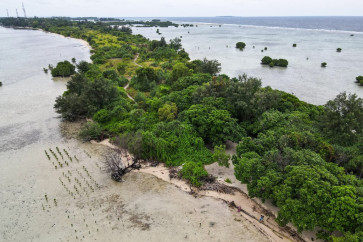Editorial: Great green hopes
There is hope for Indonesiaâs environment, at least according to the Presidentâs special envoy on climate change, Rachmat Witoelar, who revealed this week the governmentâs bid to set a higher national emissions reduction target ahead of the UN climate change conference in Paris at the end of the year
Change Size

T
here is hope for Indonesia's environment, at least according to the President's special envoy on climate change, Rachmat Witoelar, who revealed this week the government's bid to set a higher national emissions reduction target ahead of the UN climate change conference in Paris at the end of the year.
No clear-cut number was mentioned, pending President Joko 'Jokowi' Widodo's approval, but Rachmat's remarks raise hope that Indonesia, along with other nations, can establish a global emissions reduction target ' the basis for a new legally binding climate change regime to replace the expired Kyoto Protocol.
If the negotiations run as expected, the new protocol is expected to be inked in Paris and come into force in 2020, helping to slow down the greenhouse gas emissions blamed for warming our planet.
A higher target will increase hope for a strong commitment to avoid the negative impacts of climate change that will not only assault the world's ecosystem that we share, but will also cause ever more droughts, floods, heat waves and rising sea levels, affecting many aspects of people's lives, from health to economic development.
A higher target would also earn our country more respect, as when then president Susilo Bambang Yudhoyono made a pledge in 2009 to cut the country's greenhouse gas emissions by 26 percent at a minimum and 41 percent with international support by the year 2020.
The key to achieving the goal is a shift in energy consumption. The use of fossil fuels is widely blamed for a build-up of warming greenhouse gases in the atmosphere.
It is encouraging to learn that even without a clear stipulation on the roles of cities and regencies in Presidential Regulation No. 61/2011 on the national action plan to reduce greenhouse gas emissions (RAN GRK), several localities across the country have stepped up their green efforts.
Jakarta, for instance, has joined more than 7,000 world cities for the annual Earth Hour campaign, introduced an integrated transport system and built bicycle lanes.
Inspired by the Earth Hour, Bandung city administration in West Java has, since last year, required government offices and houses to switch off their power for an hour every Tuesday and Friday while setting aside space for bicycle lanes, and is currently planning to build an integrated transport system to deal with the city's chaotic and noxious traffic.
In the East Java capital, Surabaya, the city administration has promoted lower energy consumption, such as by replacing standard light bulbs in some areas with solar-powered ones. Other regions have also made their own green moves by turning to cleaner energy sources like solar, wind and hydro power.
Many individuals have also started to contribute, from taking public transport or cycling to powering down electronics.
Small steps add up, if we all do our bit. Now, let's see if the government, in this case President Jokowi, is willing to do his part and turn hopes into reality.









